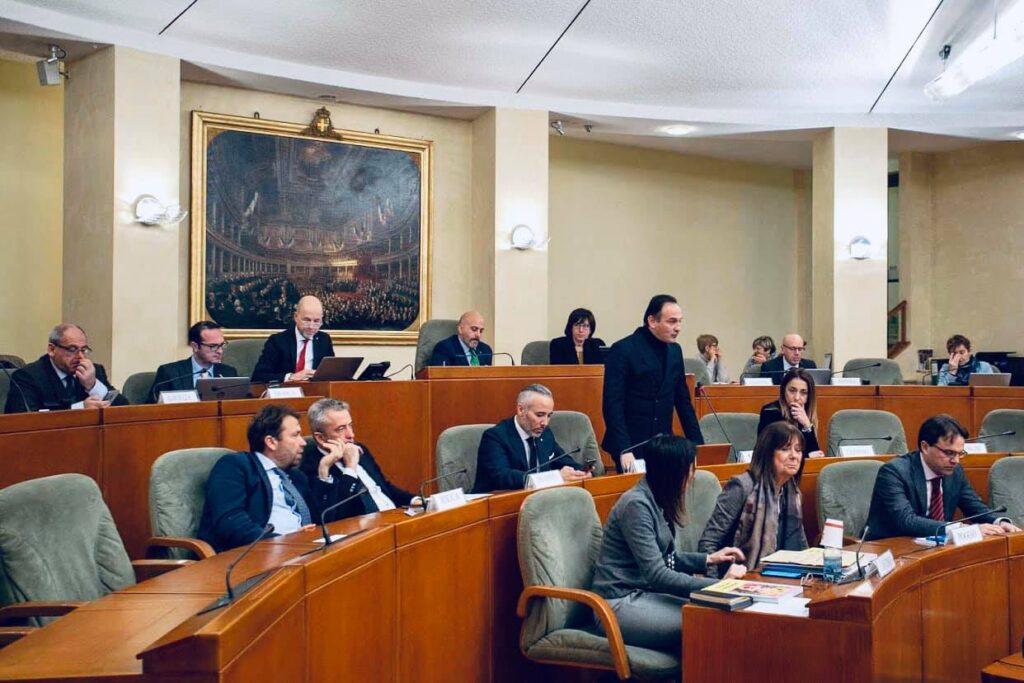
With an agenda approved at the end of the session of January 7, the Regional Council recognized that Piedmont is in an employment and wage emergency situation and therefore requests a series of concrete initiatives that need the support of the state, such as refinancing in derogation of the layoffs and 150 million euros for the areas affected by industrial crises, as had been announced by Prime Minister Giuseppe Conte in his visit to Piedmont.
The intervention of President Cirio
The meeting had been opened by President Alberto Cirio remembering that “we decided to convene a special regional council dedicated to industrial crises and work because 5,000 places at risk make us talk about employment calamity. It is a theme from which we cannot escape, but instead face in all its gravity and drama and have the clear ideas of the situation that we will face in 2020 “.
According to Cirio, the Government must do its part: “The complex project area was presented to Premier Conte, the complex development area that goes from Turin to Ivrea, Susa and Pinerolo and which concerns the Competence Center, Olivetti, the Health Park, the compensation works of the Turin-Lyon. Today only 30 million are available by the Piedmont Region. I asked Conte an official communication of how much the state can allocate the 150 million scheduled at the beginning for Turin and then extended to all of Italy. We would like to know which share will be destined for usas our European programming also depends on it. Otherwise you risk not starting concretely. “
Speaking of the agreement between FCA-PSAclaimed that “you have to not only comment, but also supervise so that such an important agreement is transformed into a guarantee of development for our territory. I therefore asked the EMEA manager of FCA, Pietro Gorlier, a meeting to be held on January 31 at the Presidency of the Region, to which I will also invite the council group leaders, to have a clear and exhaustive framework on the merger and a moment of verification on the fact that this agreement moves to benefits for workers and throughout the area on our territory. We have already been assured that the new group will take charge of the commitments that FCA had been made towards Turin, Piedmont and Italy: 5 billion of investments for Italian plants and the objective of full employment by 2022 “.
At the time of the vote, the president wanted to thank “All the directors for welcoming my proposal to vote on a shared document that will have concrete repercussions. Solidarity is not enough, now The government promises must follow facts“..
The employment situation in Piedmont and the measures to the study
The councilor for work, Elena Chiorinothen carried out a long report on the employment situation of Piedmont, from which it is clear that the Istat framework of quarter of July-September 2019 appears decidedly critical in Piedmont, with a drop in employees of 17,000 units, Concentrate in the manufacturing industry (-25,000), which after a brilliant beginning of the year already in the second quarter was flexed, while the situation in services remains substantially stagnant (+2,000 units) and only agriculture shows an appreciable positive dynamic (+4,000 employees). The decrease only affects the employment work (-34,000 employed), while the autonomous component is growing by 16,000 units, driven by non-commercial services.
They are approximately 50 companies that benefit from extraordinary layoffs For corporate crisis, reorganization and termination of activities, for a complex of about 2500 employees, mainly in the metalworking and publishing sectors, and are highlighted well 20 companies in layoffs for cessation of activities (800 people concerned). These are accompanied by these 75 companies that implement CIGS for solidarity contracts, including the best known is FCA with about 4,000 employees. It is expected In 2020 a further aggravation of the situationas shown by the recent outbreaks of crisis that emerged at the end of 2019 as Martor of Brandizzo, Mahle, ex Ilva (the latter involves 800 employees, to whom those of the survey must be added, which concerns thousands of companies, of which 3,000 only as regards crafts).
Chiorino then focused on the intervention tools adopted by the Region so faras the possibility of extending the duration of the Cigs period in the face of the activation of specific regional interventions of active policies for work, the definition of interventions aimed at preventing the onset of corporate crisis, the convocation for next week of a table on the automotive that draws all possible solutions to safeguard that a historic excellence of the territory also in the light of the merger between FCA and PSA, meetings with the exponents of the plastic sector and sugar as the provisions of the 2020 state budget law are already blocking all investments, the use of the surrogate payment started with Manital employees, agreements with Intesa Sanpaolo and Banca Sella to anticipate the layoffs without waiting for the conclusion of the INPS procedures.
“And since the corporate crises arrive too often at the tables of the department when the situation is already seriously compromised, it was thought – concluded Chiorino – of focus on prevention, allocating a million financers that will serve to support a project that involves the involvement of mentors of proven experiencewho enter companies at the moment healthy, analyze the situation and report the strengths to the owner, but also weaknesses and fragility before these degenerator. All this also happens with a view to rationalization of costs: it is more expensive to intervene on a reality in difficulty rather than supporting it in advance. Healthy companies also means more growth and more jobs or, at least, the maintenance of the current ones. To counteract, then, the ‘industrial jackal’ of those speculative funds that buy local companies in crisis for the sole purpose of acquiring their brand, but subsequently disinteresting production realities in the area and workers, the Department is working on theEstablishment of a fund that can temporarily acquire shares of companies in crisis and allow them to relaunch themselves. At the study there are also a project based on microcredit and solutions to stem the phenomenon of piecework work, which is increasing and under everyone’s eyes. These are people, for example for the Riders, forced too often to work without protections and not sustainable economic conditions “.







